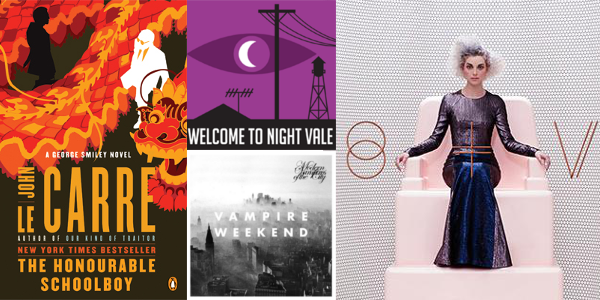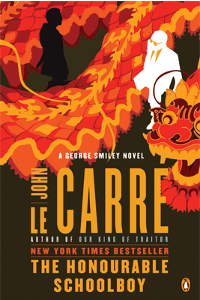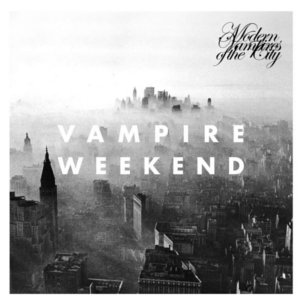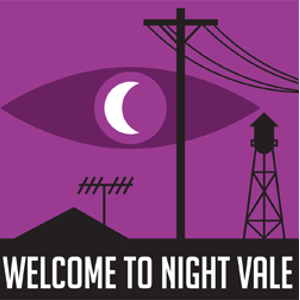What We’re Loving — Midterms Week

Image courtesy of Penguin Group USA, Commonplace Books, vampireweekend.com, and ilovestvincent.com

“Oh what an ordinary day: take out the garbage, masturbate.” So sings Annie Clark, better known as St. Vincent, on her new self-titled album. Each song is distinctive, but pure St. Vincent: frenetic guitar lines are mixed up with sometimes poetic, sometimes painfully honest, lyrics. The album is one for our digital age — Clark asks, on one song, “what’s the point in even sleeping if I can’t show, if you can’t see me?” But although some of her lines critique our obsession with the virtual world, the music, incorporating electronic elements far more than on previous albums, seems to channel a certain modern, spastic energy. The album is confounding- multiple listens reap new rewards. But every listen is a good time: St. Vincent’s songs are innovative, esoteric, and pure fun.
– Elliott Eglash

The world’s unsexiest spy is at the top of his game in John Le Carre’s novel The Honourable Schoolboy, as British Secret Service Chief George Smiley takes on Karla, his nemesis in the Kremlin. But to classify the novel as merely a sequel to one of Le Carre’s masterpieces of spy fiction, Tinker Tailor Soldier Spy, is to do it a great injustice. This novel, published in 1977, sets up a panoramic portrait of Cold War-era Southeast Asia, incorporating the Fall of Saigon, the rise of the Khmer Rouge in Cambodia, and the final throes of British power in colonial Hong Kong. Certain scenes, such as those in Cambodia, are imbued with Apocalypse Now-style gravity, lending the novel a philosophical weight that is not easy to shake. From the moment we meet the novel’s hero, the Hon. Jerry Westerby, we are met with a profound sense of fatalism, the same sense of fatalism invoked when, in a similar moment, Frodo decides to take the ring to Mordor in The Lord of the Rings. As Smiley’s proxy and journalist detective, Jerry Westerby accepts a mission in Southeast Asia that has grave implications for the British Secret Service. So much more than a detective novel, The Honourable Schoolboy is a literary thriller deeply in tune with the intrigue of Southeast Asia and Cold War politics.
– Harrison Blackman

It’s rare that I find myself listening to a song over and over again to make sense of its cryptically poetic lyrics. I’m often confused by lyrics for all the wrong reasons — either because they don’t make sense or because I can’t discern individual words beneath a muddle of Bon Iver-esque instrumentals. “Hannah Hunt” is an exception to this rule — it is the sixth song in Vampire Weekend’s latest album, Modern Vampires of the City. The vocalist, Ezra Koenig, sings of traveling across the United States with a woman named Hannah Hunt as the two make their way from Providence to Santa Barbara. A subtle melody and piano accompaniment emphasize the importance of the lyrics. My favorite line is the chorus, though it is repeated only twice — “though we live on the US dollar/ you and me we / got our own sense of time.” I may be reading too closely into the words, but I like to imagine this phrase as a witty response to the over-used capitalist mantra, “time is money,” which places Hannah and the singer in an America of their own. And all of lyrics reflect a similar depth that allows for over-analysis, as the singer rejects the notion of divine intelligence and claims that only Hannah Hunt knows his thoughts. The final verse of the song describes Hannah crying in Santa Barbara, longing for “freezing beaches,” and tearing up the New York Times. Each time I hear “Hannah Hunt” I am reminded that lyrics and music and poetry can all profess love without reverting to love-sick cliché. When the song ends I am left with an understanding of Hannah’s nostalgia for the frigid North East, and I long to know more about the singer and his Hannah Hunt. So I listen again.
– Clara Wilson-Hawken

I recently started listening to Welcome to Night Vale, a podcast that’s been airing twice a month since June, 2012, and caught up on all forty-something episodes in about two weeks. This reflects both the addictiveness of the podcast and my own procrastination habits. I often find myself incredibly disturbed, laughing aloud, and oddly touched in the span of a single episode. Welcome to Night Vale is the fictional community radio show of Night Vale, a town located somewhere in the desert of the American Southwest. Night Vale is the setting of many unusual phenomena, including a glowing cloud and a house furnished with small photographs of windows. Cecil Palmer, the voice of Night Vale, reports on the strange happenings in his smooth voice. His infectiously cheery personality is often shadowed by his frustrations with his job and the police state he lives under. There’s a set of eccentric recurring characters, such as The Faceless Old Woman who secretly lives in your home, Intern Dana, The Man in the Tan Jacket, and Cecil’s love interest Carlos the Scientist. Besides updating Night Vale on its goings-on, Cecil reads advertisements, features segments like the Children’s Fun Fact Science Corner, and gives the weather report — always a musical selection. I’m continually impressed by the clever plays on idiomatic phrases and common sayings the writers sprinkle throughout the episodes. One of my favorites: “If you love someone, set them free. Set them free now. This is the police, and we have you surrounded.” For fans of Twin Peaks and the surreal and zany, Welcome to Night Vale is for you.
– Emily Tu